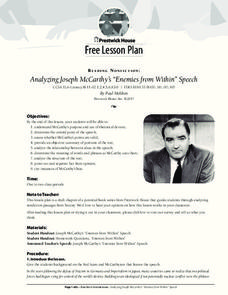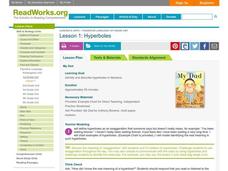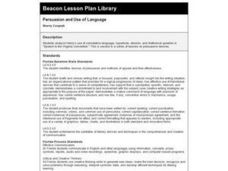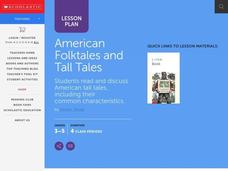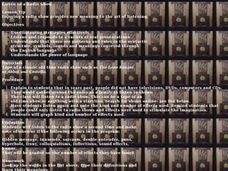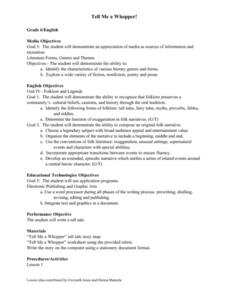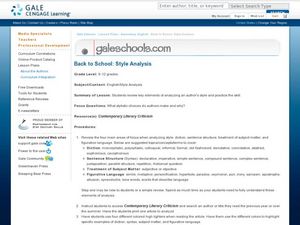Curated OER
Greek Theater Masks
Sixth graders learn the importance of mask in Greek theater, explore the history of Greek theater, integrate planning - design and construct a mask that shows exaggeration of features, build up features using paper mach mash, enhance...
Curated OER
History According to Shakespeare
Students read Shakespeare's, Julius Caesar while identifying a number of literary elements including simile, metaphor, personification, and hyperbole. As a response activity, they simulate a mock trial, and finally, compare and contrast...
Curated OER
Art Lesson: Doll Making
Learners read and discuss the main characters and supporting characters in the African folktale, "Tiger and the Big Wind." They highlight the physical features of the animal that makes them unique and transfers those same qualities to...
K20 LEARN
Where I'm From: Poetry
We carry memories of where we're from; tweens and teens can capture these memories by first listening to several memory poems and then crafting their own. They analyze literary devices other poets use, brainstorm a list of images they...
K20 LEARN
Is Pizza Epic? Word Choice
Remember when everything was Fantastic! Fabulous! Awesome! Iconic! A series of activities encourages young writers to move beyond these overused descriptors and instead choose a more precise language.
Prestwick House
Reading Nonfiction: Analyzing Joseph McCarthy's "Enemies from Within" Speech
Looking for a lesson that teaches class members how to analyze nonfiction? Use Joseph McCarthy's famous "Enemies from Within" speech as a instructional text. Worksheet questions direct readers' attention to the many historical...
Learning for Justice
Maya Angelou
Maya Angelou's poem, "Still I Rise", offers young scholars an opportunity to consider how poets use literary devices to create powerful messages. After a close reading and discussion of the poem, class members reflect on how they can...
K20 LEARN
Criminal Motivations: Irony and Characterization In "The Cask Of Amontillado"
Edgar Allan Poe's short story "The Cask of Amontillado" is a bit of a puzzle. Critics have long debated Montresor's motives for killing Fortunato. Young scholars examine examples of the three types of irony (verbal, dramatic, and...
Curated OER
Poetry: Simile And Figurative Language
Students explore websites that contain poems about autumn, winter, and the seasonal holidays and explore how similes and figurative language can be used in poetry.
Curated OER
Hyperboles
Want to see the best instructional activity is the entire universe? Who doesn't love to exaggerate now and then? Get your class cozy with hyperbole as you read the story My Dad by Anthony Browne. During the reading you'll chart...
Curated OER
Poetry of Abraham Lincoln
Fourth graders analyze Abraham Lincoln's poems "The Bear Hunt" and "My Childhood's Home" for word choice and deeper inquiry into the vocabulary he uses to convey emotion. They identify rhyming words and patterns in these poems. ...
Curated OER
Figurative Language-Part 1
Young scholars explore figurative language. For this figurative language lesson, students look up, define, and give examples of a list of literary terms.
Curated OER
Metaphors, Personifications, Similes, and Hyperboles
Fourth graders discuss prior knowledge of the terms simile, hyperbole, metaphor, and personification. They then listen to the definitions of each and write a hyperbole, personification, simile, and metaphor to describe a Mr. Potato Head...
Curated OER
Figurative Language in Poetry and Prose
Students examine the impact of sound devices in poetry. In this poetry lesson, students read the listed poems and identify uses of hyperbole, simile, metaphor, imagery, and personification. Students discuss how sound devices enhance poetry.
Curated OER
Persuasion and Use of Language
Students discuss connotative language, hyperbole, allusion, and rhetorical question. In small groups, they read one section of the "Speech to the Virginia Convention" and analyze these devices. Groups present their results to the class.
Curated OER
Figuratively Writing...It's for the Birds!
Learners identify and use literary devices such as personification, idioms, hyperbole, and metaphors. They identify one literary device and illustrate the meaning. They write a letter using correct letter format and incorporates literary...
Curated OER
"Journalism in Tennessee"
Students listen to headline from National Enquirer or other tabloid, listen to story "Journalism in Tennessee," compare and contrast connections between Twain's idea of journalism with present day journalism, define vocabulary, and...
Curated OER
American Folktales and Tall Tales
Young scholars explore the elements of American folktales. They discuss how they are passed on from generation to generation, how they use exaggeration, and how they convey a message or make a point. Students identify common elements...
Curated OER
I Know Why the Caged Bird Sings
Students use Maya Angelou's novel, I Know Why the Caged Bird Sings to identify themes about adversity in the text. For this adversity, students read chapter 36 of the novel and discuss the examples of adversity in the book. Students...
Curated OER
Listen to a Radio Show
Students practice the art of listening. For this listening skills lesson, students listen to an old-time radio show and identify hidden messages, innuendo, sarcasm, double entendres, puns, hyperbole, irony, colloquialisms, inflections,...
Curated OER
Tell Me a Whopper!
Sixth graders investigate tall tales as a literary genre. They listen to a number of tall tales to discover how exaggeration is used as a story element. They write and publish a tall tale using word processing software. They illustrate...
Curated OER
Tell a Ton of Tall Tales
Elementary schoolers read many tall tales. They create their own tall tale about a specific event of their choosing. They must act the part of the author. This well-designed lesson takes three class sessions to complete, and is...
Curated OER
Back to School: Style Analysis
Jump back into expository writing and analysis at the start of a new school year! Start with a review of an authors' stylistic choices in diction, syntax, treatment of subject matter, and figurative language. Writers choose a text to...
Curated OER
Sadako and the Thousand Paper Cranes
Have your class explore the effects of war by reading Eleanor Coerr's story, "Sadako and the Thousand Paper Cranes." This is a story about a sixth grader who lives in Hiroshima when the atomic bomb is dropped. Learners answer questions,...
Other popular searches
- Hyperbole or Exaggeration
- Paul Bunyan and Exaggeration
- Exaggeration of Facts
- Exaggeration and Bias
- Reading Exaggeration
- Exaggerations
- Folktales and Exaggeration
- Tales Exaggeration
- Exaggeration in Nonfiction
- Tall Tale Exaggeration
- Exaggeration Tall Tales
- Exaggeration Lessons





